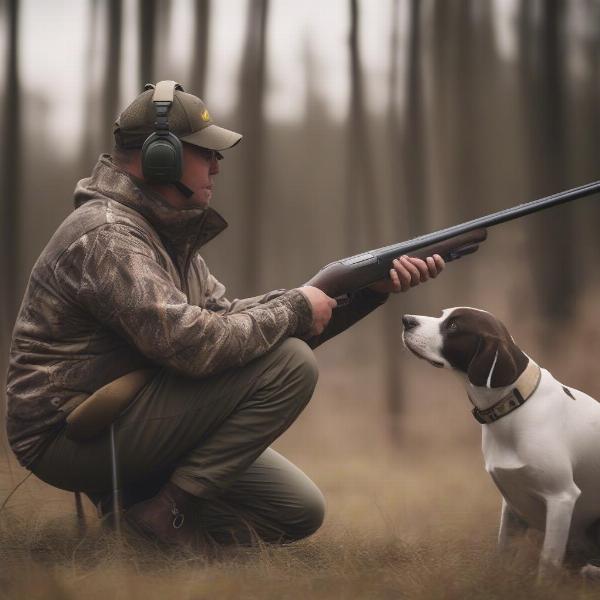“That dog will hunt!” is a phrase often heard among hunting enthusiasts, referring to a canine companion with the instinct and drive for the sport. But what truly makes a dog a successful hunter? It’s more than just inherent ability. It’s a combination of breed predisposition, dedicated training, and a strong bond between dog and handler. This article will delve into the world of hunting dogs, exploring suitable breeds, training techniques, and essential gear to ensure a safe and rewarding hunting experience.
Choosing the Right Hunting Breed
Selecting the right breed is paramount for successful hunting. Different breeds excel in different roles, from retrieving waterfowl to tracking game in dense forests. Some popular choices include:
- Pointers and Setters: Known for their keen sense of smell and ability to “point” towards game, these breeds are ideal for upland bird hunting.
- Retrievers: As their name suggests, these dogs are skilled at retrieving downed game, especially waterfowl. Golden Retrievers and Labrador Retrievers are popular choices.
- Hounds: Breeds like Beagles and Foxhounds are known for their exceptional tracking abilities and stamina, making them suitable for hunting rabbits and other small game.
- Spaniels: These energetic dogs flush game from cover, making them ideal for hunting birds in dense vegetation.
Consider your specific hunting needs, the terrain you’ll be hunting in, and your lifestyle when selecting a breed. Researching different breeds thoroughly is crucial before making a decision.
Essential Hunting Dog Training
Even the most naturally gifted hunting dog requires proper training to become a reliable and safe hunting partner. Basic obedience training is the foundation, followed by specialized training tailored to the specific hunting discipline.
- Obedience Training: Commands like “sit,” “stay,” “come,” and “heel” are crucial for controlling your dog in the field.
- Scent Training: Introduce your dog to the scent of the game you’ll be hunting early on.
- Gun Dog Training: If you’ll be using firearms, desensitize your dog to the sound of gunfire and ensure they remain steady during shooting.
 Gun Dog Training
Gun Dog Training - Retrieval Training: For retrievers, introduce retrieving dummies and gradually progress to real game.
Gear Up for Success
Having the right gear is essential for both you and your dog’s safety and comfort during hunts.
- Hunting Vest: Keeps essential gear organized and accessible.
- Dog Collar and Leash: For control during transport and non-hunting situations.
- E-Collar: Used for training and reinforcement in the field. rabbit dog for sale
- First-Aid Kit: Be prepared for minor injuries in the field.
- GPS Tracking Collar: Provides peace of mind by allowing you to track your dog’s location. golden retrievers as hunting dogs
Building a Strong Bond
A strong bond between hunter and dog is essential for a successful and enjoyable hunting experience. Spend time bonding with your dog outside of hunting activities, engaging in play, and providing plenty of affection. This bond will foster trust and cooperation, making your dog a more effective and reliable hunting partner. dog hunting shock collar
Conclusion
“That dog will hunt” is a testament to the dedication and training that goes into creating a successful hunting partnership. Choosing the right breed, providing comprehensive training, and building a strong bond are key ingredients for success. With the right approach, you and your canine companion can enjoy many rewarding seasons in the field. prairie dog hunting wyoming
FAQ
- What age should I start training my hunting dog? Early socialization and basic obedience training can begin as early as 8 weeks old. Specialized hunting training can start around 6 months old.
- Are all hunting dogs suitable for families with children? While many hunting breeds are friendly and good with children, it’s important to consider individual temperament and ensure proper socialization.
- How much exercise does a hunting dog need? Hunting dogs are energetic and require significant daily exercise, even outside of hunting season.
- What are the legal requirements for hunting with dogs? Regulations vary by location, so it’s essential to check local laws and obtain necessary permits.
- What should I do if my dog gets lost during a hunt? A GPS tracking collar is highly recommended for this scenario.
ILM Dog is a leading resource for dog owners worldwide, providing expert advice on dog breeds, health, training, nutrition, and more. We offer a wealth of information to help you choose the right breed, provide optimal care, and build a strong bond with your canine companion. momarsh dog blinds Contact us today for personalized guidance and support: Email: [email protected], Phone: +44 20-3965-8624. ILM Dog is committed to helping you and your furry friend thrive.